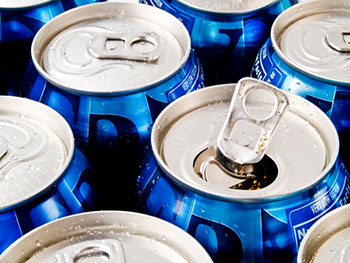More Health and Nutrition Bites
Related
Diet Sodas: Do They Make You Fat?
According to the Coca Cola Company, Fresca products have about 2 calories in an eight ounce serving. A can of Fresca is 12 ounces so 6 cans per day would be only 18 calories.
Sugared soda drinkers more likely to develop type 2 diabetes
A Finnish study reported in the Journal of Nutrition (2007;137(6):1447-1454) shows a link between sugared soft drink consumption and the development of type 2 diabetes.
Visualize the Sugar
I've written easily half a dozen reports on different research articles focusing on the effects of drinking sugar-sweetened beverages on your weight and your kids' weight as well as contributing to high blood pressure, poorer cholesterol scores, diabetes, gout, and kidney disease.
Health & Nutrition Bites
Get the latest health and diet news - along with what you can do about it - sent to your Inbox once a week. Get Dr. Gourmet's Health and Nutrition Bites sent to you via email. Sign up now!
Diet sodas may still increase your risk of diabetes

We've seen in previous research that drinking more sugared sodas (as opposed to sodas sweetened with calorie-free sweeteners) has been linked to a greater risk of diabetes. That would seem to be obvious: more sugary sodas means more calories consumed, so people are more likely to be overweight and thus more likely to develop diabetes. Yet other research showed that those who drank two cans of diet soda per day were more likely to be overweight at the end of an eight-year study than those who only drank regular soda.
Worse yet, switching to diet sodas doesn't seem to help people lose weight - in fact, in one study those who switched their sugar-sweetened sodas to water lost more weight than those who switched those same sugary beverages for the diet versions.
But what about diet sodas and diabetes? I've noted before that medicine is not math, so the Transitive Property of Equality (if A=B and B-C, then A=C) doesn't apply: drinking diet sodas might mean gaining weight, but it might not mean a higher risk of diabetes. A team of researchers, with funding from the National Institute of Health, used data gathered through a large-scale, long term study to investigate the possible associations between regular and artificially-sweetened (calorie-free) sodas and the risk of diabetes (Am J Clin Nutr 2017;106(2):614-22).
The data came from the Women's Health Initiative, which began in 1993 and eventually recruited over 64,000 women across the United States who were between the ages of 50 and 79. The original research collected information from blood tests, physical exams, medical and personal history, and detailed dietary and lifestyle questionnaires.
Those dietary questionnaires included questions about how often the participants drank regular or diet soft drinks during the 3 months prior to the questionnaire's administration, as well as how much tap or bottled water they consumed. For the purposes of their research, the authors standardized the serving sizes of soft drinks (which included sodas, fruit juices and fruit drinks) and water (both bottled and tap) to servings of 12 ounces (a typical can size for sodas) and broke out the servings of each beverage into 4 increasing levels of intake.
The researchers could then correlate the beverage intake of those women who reported being diagnosed with diabetes with those women who did not, taking into account such factors as Body Mass Index, family history of diabetes, race, age, Waist to Hip ratio, ethnicity, and the women's score on the Alternate Healthy Eating Index (a measure of their adherence to the USDA's Healthy Guidelines for Americans).
Interestingly, the more artificially-flavored (diet) beverages the women drank - even after also taking into account the amount of sugar-sweetened (regular) beverages they drank - the higher was their risk of developing diabetes. While drinking up to 6 such beverages per week (less than 1 per day) only increased their risk by a couple of percentage points, drinking 1 diet beverage every day (7 or more per week) upped their risk by 24%. Those who drank sugar-sweetened beverages, on the other hand, saw their risk for up to 6 beverages per week go up by only 9%, while drinking 2 or more servings per day (2 cans) meant a 43% rise in their risk of diabetes.
Further analyses compared what might happen if the participants switched from those beverages to water, showing that switching just 1 serving of the diet beverages for water might decrease their risk of diabetes by 5% - and switching a sugar-sweetened beverage for water decreased the risk by 10%.
What this means for you
This study shows association, not cause. The authors note that those who drank more artificially-flavored (diet) beverages were more likely to smoke, got less exercise, had poorer scores on the Alternate Healthy Eating Index and were more likely to have a family history of diabetes, so one could argue that the diet beverages were simply an indication of a poorer overall diet and poorer health habits. That said, the data regarding switching to water is fairly compelling, so if you do drink sodas, try to keep your intake to a few cans a week, and work on switching to water. We know water is good for you.
First posted: August 16, 2017
